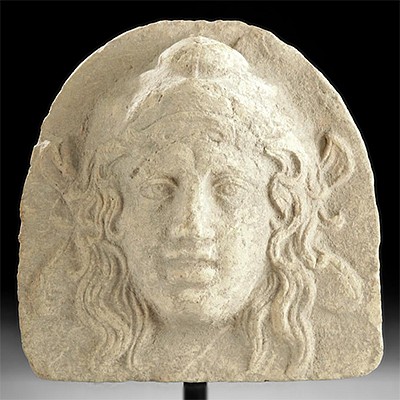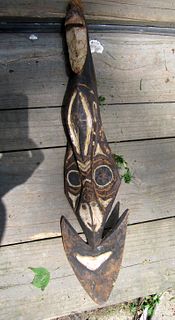20th C. Indonesian Moluccas Ancestral Marker w/ Finial
Lot 114d
About Seller
Artemis Fine Arts
686 S Taylor Ave, Ste 106
Louisville, CO 80027
United States
Selling antiquities, ancient and ethnographic art online since 1993, Artemis Gallery specializes in Classical Antiquities (Egyptian, Greek, Roman, Near Eastern), Asian, Pre-Columbian, African / Tribal / Oceanographic art. Our extensive inventory includes pottery, stone, metal, wood, glass and textil...Read more
Categories
Estimate:
$2,000 - $3,000
Absentee vs Live bid
Two ways to bid:
- Leave a max absentee bid and the platform will bid on your behalf up to your maximum bid during the live auction.
- Bid live during the auction and your bids will be submitted real-time to the auctioneer.
Bid Increments
| Price | Bid Increment |
|---|---|
| $0 | $25 |
| $300 | $50 |
| $1,000 | $100 |
| $2,000 | $250 |
| $5,000 | $500 |
| $10,000 | $1,000 |
| $20,000 | $2,500 |
| $50,000 | $5,000 |
| $100,000 | $10,000 |
| $200,000 | $20,000 |
About Auction
By Artemis Fine Arts
Feb 27, 2020
Set Reminder
2020-02-27 10:00:00
2020-02-27 10:00:00
America/New_York
Bidsquare
Bidsquare : VARIETY SALE | Antiquities & Ethnographic Art
https://www.bidsquare.com/auctions/artemis-gallery/variety-sale-antiquities-ethnographic-art-4920
Around the world & back in time - be amazed at the treasures you will find. Antiquities from Egypt, Greece, Italy and the Near East, Asian, Pre-Columbian, African / Tribal / Oceanic, Native American, Spanish Colonial, Russian Icons, Fine Art, much more! Artemis Fine Arts info@artemisgallery.com
Around the world & back in time - be amazed at the treasures you will find. Antiquities from Egypt, Greece, Italy and the Near East, Asian, Pre-Columbian, African / Tribal / Oceanic, Native American, Spanish Colonial, Russian Icons, Fine Art, much more! Artemis Fine Arts info@artemisgallery.com
- Lot Description
Southeast Asia, Indonesia, southeastern Malaku Islands (Moluccas / Spice Islands), ca. early 20th century CE. A massive carved wooden ancestral marker, made of two pieces - one, a long, canoe-shaped form with two projecting prow ends, each ornately carved with zoomorphic openwork - and the other a tall finial that branches into the form of a sea bird with its wings spread wide. Red and green pigment decorates much of the surface, especially of the finial, which is incised with swirling motifs. Size: 22.25" L x 44.5" W x 71.5" H (56.5 cm x 113 cm x 181.6 cm)
The remote islands of southeastern Malaku remained largely uncontacted by Europeans until the 20th century, in contrast with northern Malaku, which was the ancestral home of cloves, nutmeg, and mace and was decimated by outsiders as they tried to control trade in these commodities. In the south, native people created beautiful artwork, often focusing on nautical iconography, like the canoe form here. Representations of deities and ancestors, designed to venerate them, formed the central focus of their artwork. The society is matrilineal with clans founded by women. Fascinatingly, sometimes sculptures of these clan leaders - often quite abstract - are shown with their arms spread out above their heads. The tripartite bird form at the top of this marker may be a deliberate representation of one of these figures.
Provenance: private Hawaii, USA collection; ex-P. Kessner collection
All items legal to buy/sell under U.S. Statute covering cultural patrimony Code 2600, CHAPTER 14, and are guaranteed to be as described or your money back.
A Certificate of Authenticity will accompany all winning bids.
We ship worldwide and handle all shipping in-house for your convenience.
#148501Possible small loss from one side of the lower part. Weathered cracks in the wood, especially on the canoe, do not seem to impact the stability of the piece, which stands easily on its own. Tiny inactive insect damage in very limited areas.Condition
- Shipping Info
-
All shipping is handled in-house for your convenience. Your invoice from Artemis Gallery will include shipping calculation instructions. If in doubt, please inquire BEFORE bidding for estimated shipping costs for individual items.
-
- Buyer's Premium



 EUR
EUR CAD
CAD AUD
AUD GBP
GBP MXN
MXN HKD
HKD CNY
CNY MYR
MYR SEK
SEK SGD
SGD CHF
CHF THB
THB















